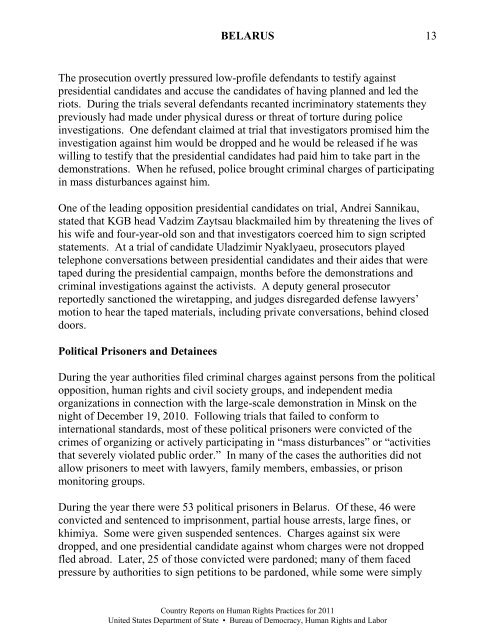belarus executive summary - US Department of State
belarus executive summary - US Department of State
belarus executive summary - US Department of State
You also want an ePaper? Increase the reach of your titles
YUMPU automatically turns print PDFs into web optimized ePapers that Google loves.
BELAR<strong>US</strong> 13<br />
The prosecution overtly pressured low-pr<strong>of</strong>ile defendants to testify against<br />
presidential candidates and accuse the candidates <strong>of</strong> having planned and led the<br />
riots. During the trials several defendants recanted incriminatory statements they<br />
previously had made under physical duress or threat <strong>of</strong> torture during police<br />
investigations. One defendant claimed at trial that investigators promised him the<br />
investigation against him would be dropped and he would be released if he was<br />
willing to testify that the presidential candidates had paid him to take part in the<br />
demonstrations. When he refused, police brought criminal charges <strong>of</strong> participating<br />
in mass disturbances against him.<br />
One <strong>of</strong> the leading opposition presidential candidates on trial, Andrei Sannikau,<br />
stated that KGB head Vadzim Zaytsau blackmailed him by threatening the lives <strong>of</strong><br />
his wife and four-year-old son and that investigators coerced him to sign scripted<br />
statements. At a trial <strong>of</strong> candidate Uladzimir Nyaklyaeu, prosecutors played<br />
telephone conversations between presidential candidates and their aides that were<br />
taped during the presidential campaign, months before the demonstrations and<br />
criminal investigations against the activists. A deputy general prosecutor<br />
reportedly sanctioned the wiretapping, and judges disregarded defense lawyers’<br />
motion to hear the taped materials, including private conversations, behind closed<br />
doors.<br />
Political Prisoners and Detainees<br />
During the year authorities filed criminal charges against persons from the political<br />
opposition, human rights and civil society groups, and independent media<br />
organizations in connection with the large-scale demonstration in Minsk on the<br />
night <strong>of</strong> December 19, 2010. Following trials that failed to conform to<br />
international standards, most <strong>of</strong> these political prisoners were convicted <strong>of</strong> the<br />
crimes <strong>of</strong> organizing or actively participating in “mass disturbances” or “activities<br />
that severely violated public order.” In many <strong>of</strong> the cases the authorities did not<br />
allow prisoners to meet with lawyers, family members, embassies, or prison<br />
monitoring groups.<br />
During the year there were 53 political prisoners in Belarus. Of these, 46 were<br />
convicted and sentenced to imprisonment, partial house arrests, large fines, or<br />
khimiya. Some were given suspended sentences. Charges against six were<br />
dropped, and one presidential candidate against whom charges were not dropped<br />
fled abroad. Later, 25 <strong>of</strong> those convicted were pardoned; many <strong>of</strong> them faced<br />
pressure by authorities to sign petitions to be pardoned, while some were simply<br />
Country Reports on Human Rights Practices for 2011<br />
United <strong>State</strong>s <strong>Department</strong> <strong>of</strong> <strong>State</strong> • Bureau <strong>of</strong> Democracy, Human Rights and Labor
















